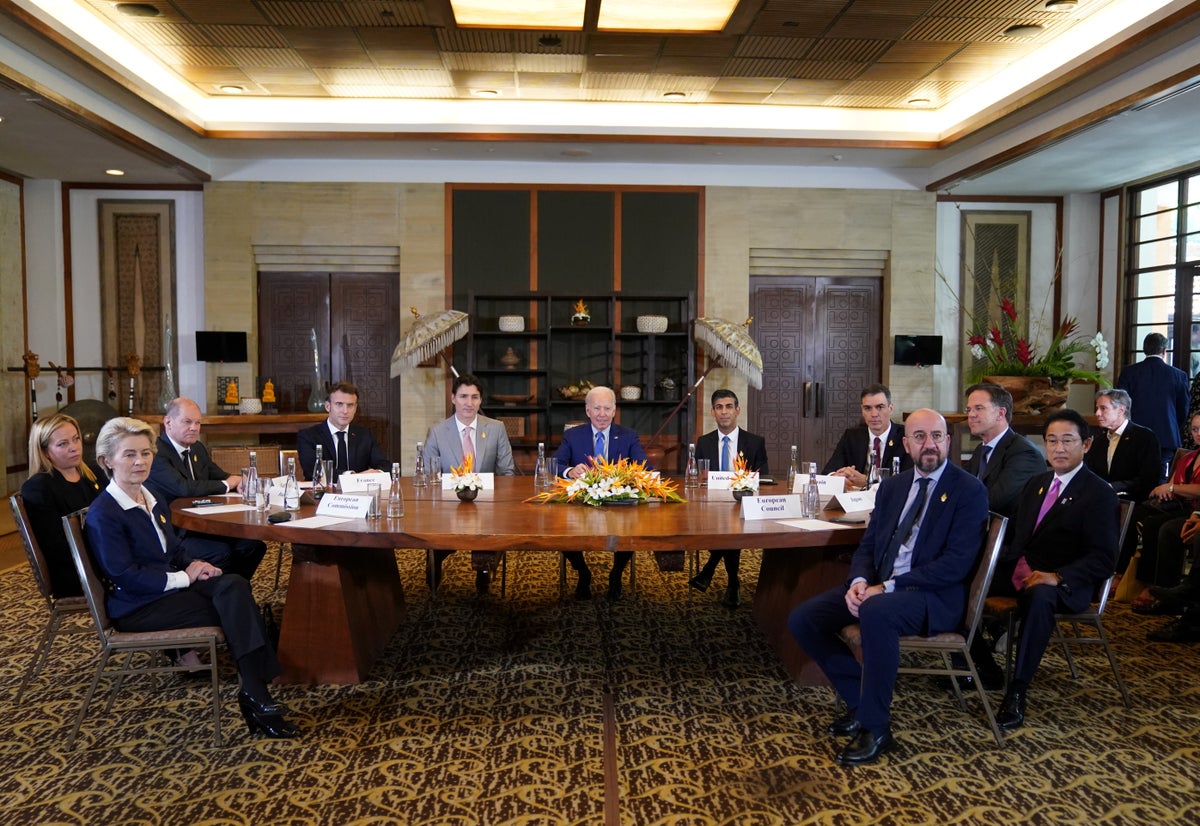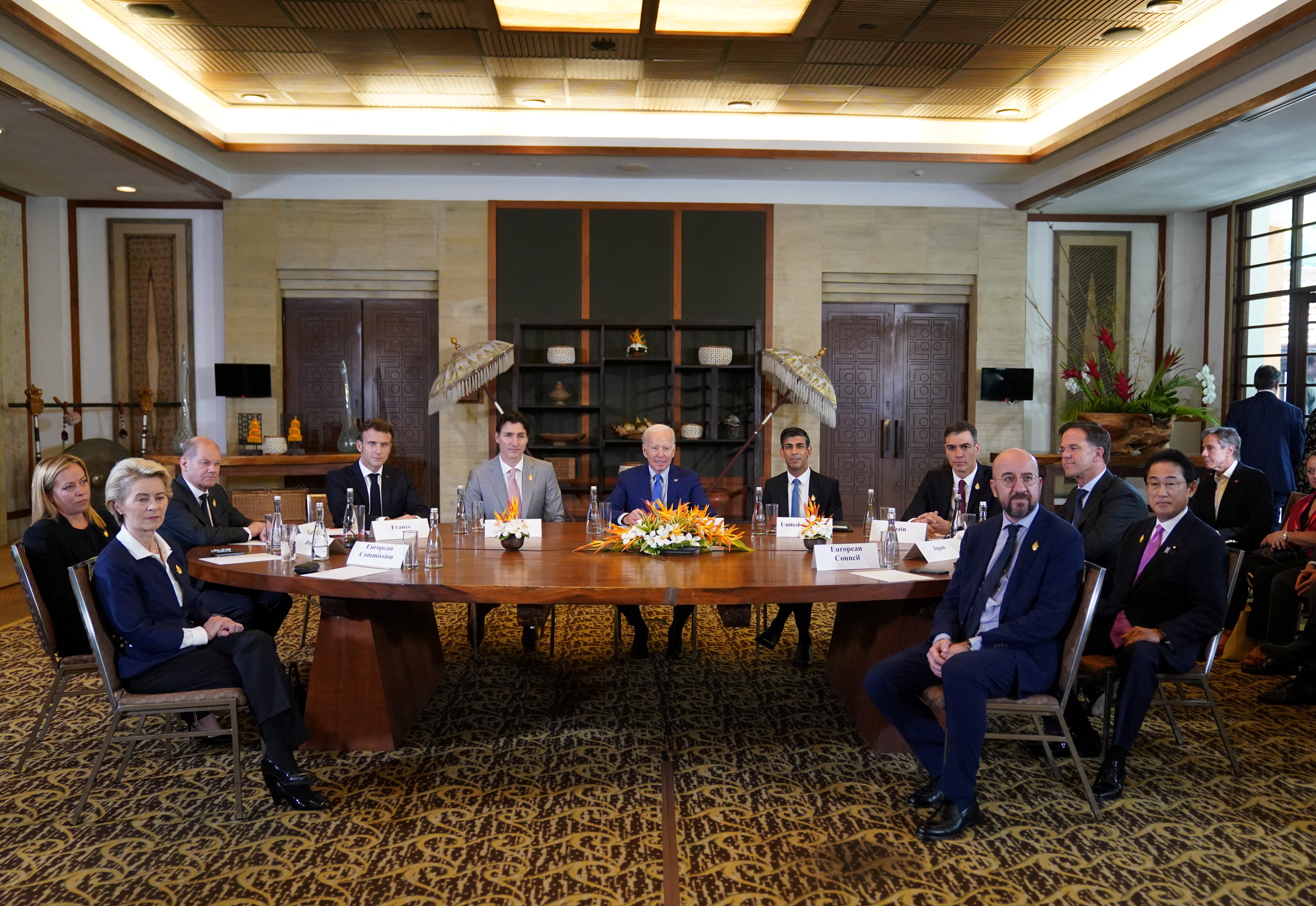
Leaders of Nato and G7 nations have agreed at an emergency meeting convened by US President Joe Biden to support Poland’s investigation into a strike on its territory by a Russian-made rocket.
The explosion in the Nato member state, which is understood to have killed at least two people, came as a wave of Russian missiles hit civilian targets across Ukraine, including capital Kyiv.
Nato and G7 leaders, including Mr Biden and British prime minister Rishi Sunak condemned the assault on Ukraine as “barbaric”.
But Mr Biden said that “preliminary information” about the trajectory of the missile which landed in Poland near to its eastern border with Ukraine meant it was “unlikely” that it was fired from Russia”.
The timing of the missile barrage appeared designed to disrupt the G20 summit in Indonesian beach resort Bali, which on Tuesday saw world leaders, including Mr Sunak, line up to voice their condemnation of Russia’s invasion of Ukraine.
Nato representatives are expected to gather in Brussels later on Wednesday for a meeting under the military alliance’s Article 4, which provides for consultations in the event of a security threat against a member state.
Mr Biden said that Nato and G7 leaders who gathered for the impromptu meeting in Bali unanimously condemned “the latest series of Russian missile attacks”, which he branded “totally unconscionable”.
“The moment when the world came together at the G20 to urge de-escalation, Russia continues to escalate in Ukraine, while we’re meeting,” Mr Biden said. “There were scores and scores of missile attacks in western Ukraine.”
He added: “I’m going to make sure we find out exactly what happened.”
“And then we’re going to collectively determine our next step as we investigate.”
In a joint statement, the leaders at the Bali meeting said: “We condemn the barbaric missile attacks that Russia perpetrated on Ukrainian cities and civilian infrastructure on Tuesday.
“We discussed the explosion that took place in the eastern part of Poland near the border with Ukraine. We offer our full support for and assistance with Poland’s ongoing investigation. We agree to remain in close touch to determine appropriate next steps as the investigation proceeds.
“We reaffirm our steadfast support for Ukraine and the Ukrainian people in the face of ongoing Russian aggression, as well as our continued readiness to hold Russia accountable for its brazen attacks on Ukrainian communities, even as the G20 meets to deal with the wider impacts of the war.
“We all express our condolences to the families of the victims in Poland and Ukraine.”
Mr Biden and his allies set out to isolate Russia at the annual G20 gathering, and the group’s final communique is expected to state that “most” of the nations in the G20 condemn Russia’s invasion.
Russian foreign minister Sergei Lavrov, who attended the G20 summit in Vladimir Putin’s place, left the gathering to return to Moscow late on Tuesday ahead of the launch of the barrage of missiles.
Both Mr Biden and Mr Sunak called Polish president Andrzej Duda in the wake of the missile strike to offer condolences and promise assistance in establishing responsibility for the attack.
Joining Mr Biden and Mr Sunak in the emergency meeting in the ballroom of the US president’s luxury hotel in Bali were Canadian prime minister Justin Trudeau, French president Emmanuel Macron and the leaders of Germany, Spain, Italy, Japan and the Netherlands, as well as the presidents of the European Council and European Commission.
Mr Biden said that he had briefed his fellow leaders on his discussions with both Mr Duda and Nato secretary general Jens Stoltenberg.
“We agreed to support Poland’s investigation into the explosion in rural Poland, near the Ukrainian border,” said the US president.

Mr Biden said there was “total unanimity” around that table in Bali that Russia’s deployment of missiles during the war in Ukraine was “totally unconscionable”.
The president was awakened by staff and informed of the attack early on Wednesday. He subsequently spoke by phone with Mr Duda to express his “deep condolences” for the Polish citizens who were killed by the Russian munitions.
Mr Duda said the weapons in question were “most probably” Russian-made and stressed that their origin was still under investigation, but the Polish foreign ministry has identified the rockets as being Russian-built.







